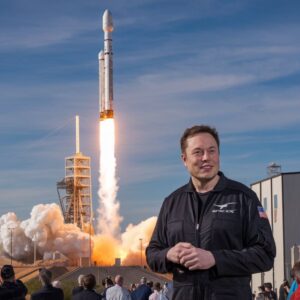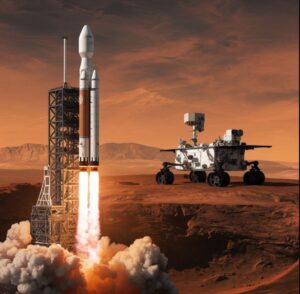Elon Musk, the enigmatic entrepreneur and founder of SpaceX, has never shied away from bold ideas. Among his most ambitious plans is to build a self-sustaining human colony on Mars. Musk believes that colonizing Mars is essential for humanity’s long-term survival and has detailed plans to make this dream a reality. But as with any grand vision, his proposal has sparked intense debate.
This article dives into the core of Musk’s Mars mission, examining its feasibility, scientific merits, and the criticisms it faces. Whether you’re an enthusiast or a skeptic, this exploration might just change the way you think about humanity’s future.
What Does Musk’s Mars Mission Entail?
Musk envisions transporting volunteers to Mars via reusable spacecraft, eventually establishing a city of about one million inhabitants. Through SpaceX, he aims to make space travel affordable to the masses, reducing the cost of a trip to Mars to a level accessible to ordinary people.
According to Musk, achieving a self-sustaining Martian colony will require thousands of rockets carrying millions of tons of cargo over the course of two decades. His ultimate goal? To ensure the long-term survival of human consciousness beyond Earth.
Musk’s Words:
“How many people do you need for a self-sustaining city? About a million, with several million tons of cargo. We can do this in 20 years.”
While some prominent figures, like biologist Richard Dawkins, have praised Musk’s vision, others remain skeptical.
The Case for Colonizing Mars
1. Mitigating Existential Risks
Musk argues that diversifying humanity’s habitat is critical for our survival. Earth faces numerous existential threats, including asteroid impacts, supervolcano eruptions, and global pandemics. Establishing a colony on Mars could serve as a “genetic backup” for humanity.
2. Technological Innovation
The quest to colonize Mars is expected to drive technological advancements in propulsion systems, sustainable habitats, and life-support technologies. These innovations could have far-reaching applications on Earth, improving life here while paving the way for interplanetary exploration.
3. Long-Term Vision for Humanity
Musk’s philosophy aligns with longtermism, a belief that humanity should prioritize the long-term future over immediate concerns. By ensuring the survival of consciousness for millions of years, a Mars colony would mark a significant step in securing humanity’s legacy.
The Challenges and Criticisms
1. Economic and Logistical Feasibility
Many experts, including astrophysicist Neil deGrasse Tyson, question the practicality of Musk’s Mars plans. A mission of this scale would cost trillions of dollars, and the return on investment is negligible. Musk himself admits that the endeavor is not commercially viable, relying instead on personal resources and potential government support.
2. Ethical Considerations
Critics argue that focusing on Mars distracts from urgent problems on Earth, such as climate change, poverty, and healthcare. Investing resources in terrestrial solutions might yield greater immediate benefits for humanity.
Lord Martin Rees, an astrophysicist, summed it up:
“The idea of mass migration to avoid Earth’s problems is a dangerous illusion.”
3. Safety and Sustainability
The journey to Mars is fraught with risks, from prolonged exposure to radiation to the psychological toll of isolation. Additionally, Mars lacks a breathable atmosphere, warm climate, or sufficient resources for large-scale habitation. Terraforming the planet—making it Earth-like—is currently beyond our technological and economic capabilities.
4. Limited Volunteer Interest
While Musk envisions a flood of volunteers eager to populate Mars, others predict a lackluster response. The extreme conditions and inherent dangers might deter all but the most adventurous or desperate individuals.
Scientific Merit vs. Practicality
From a scientific perspective, robotic missions are more effective for studying Mars’ geology, history, and potential for life. Human presence could complicate these studies by contaminating the environment. However, colonizing Mars presents unique opportunities for research in sociology, psychology, and human adaptability.
So, Is It the Right Time?
Many argue that humanity is not yet ready for Mars. Before embarking on interplanetary colonization, we should focus on developing advanced technologies, such as:
- Nuclear fusion for efficient energy production.
- Biotechnology for adapting humans to harsh environments.
- Artificial intelligence to manage complex ecosystems.
By improving life on Earth and advancing these technologies, we can make future Mars missions more feasible and less risky.
Final Thoughts: A Balancing Act
Elon Musk’s Mars mission is a bold and inspiring vision that challenges humanity to think beyond its terrestrial boundaries. While critics raise valid concerns about timing, cost, and practicality, the idea of a Mars colony sparks curiosity and innovation.
Perhaps the best course of action is to strike a balance: continue exploring Mars with robotic missions and incremental advancements while addressing the pressing issues on Earth. When the time is right, humanity will be better equipped to take the leap.
If you find this content helpful kindly visit concept source link and mention nexusweekly in comment section.
Concept Source: https://www.youtube.com/watch?v=8HNgIJqeyDw
Read More: http://nexusweekly.com

